Doctoral Studies at HNEE
Doctoral study holds a central place at HNEE. Since April 2024, the Brandenburg University and College Act (BbgHG) has provided for a doctoral college of the Brandenburg universities of applied sciences to be granted the right to award doctorates. Work is currently underway to define the framework and focus of this new college. HNEE aims to establish a distinctive profile in the support and development of doctoral candidates, and to further strengthen its role as a leading research institution within the region and beyond.
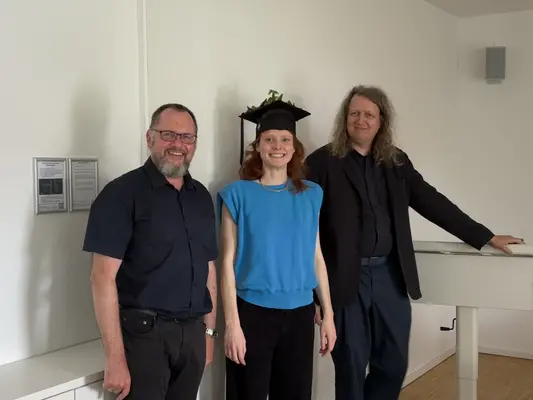
Dr Charlotte Gohr together with her doctoral examiners, Prof Pierre Ibisch and Prof Henrik von Wehrden
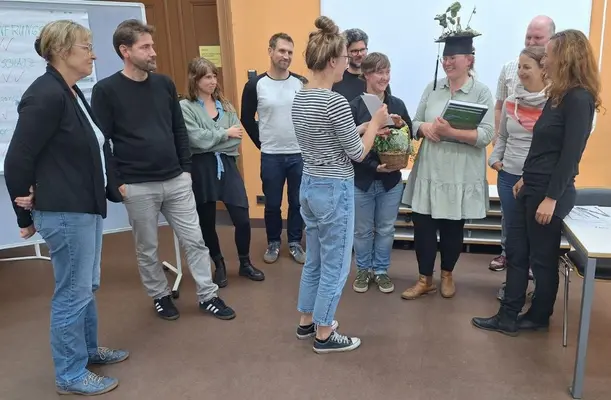
Following the successful defence of her dissertation, Dr Jenny Hammerich receives congratulations.
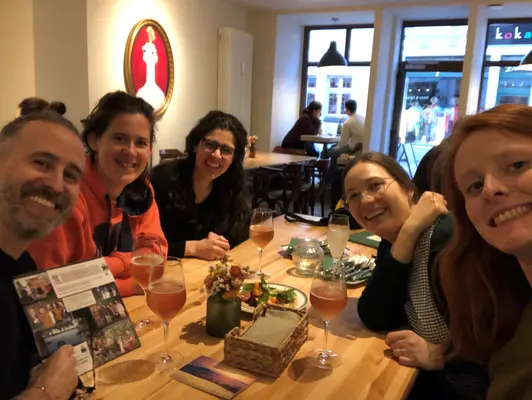
Dr Martin Balaš (left) with the BRI team
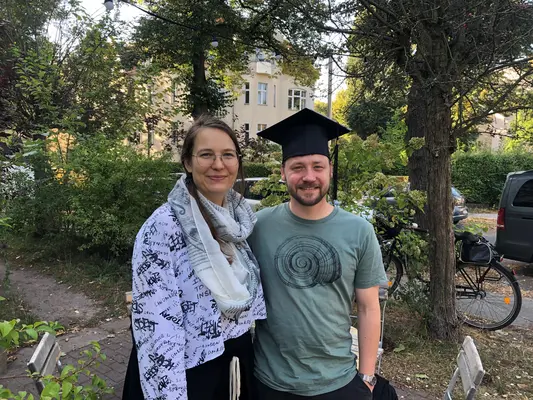
Doctoral thesis on the topic: „Long-term trends in carabid communities of old lowland beech forests in the context of severe drought.“
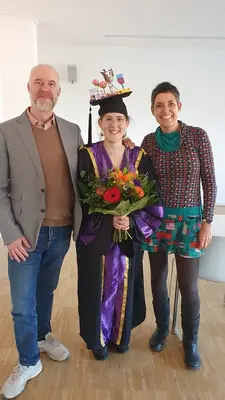
Dr Caroline Dabard with Prof Carsten Mann and Prof Berta Martín-López
Offers and possibilities
Cooperative doctorates at the HNEE
HNEE has established an agreement with → LEUPHANA University of Lüneburg to offer cooperative doctoral programmes. Together, the two universities run a → co-operative research training group on biodiversity-focused land use in biosphere reserves. Cooperative doctorates are also possible in partnership with other universities.
To date, six doctorates have been successfully completed through the cooperative programme with Leuphana. In 2024 alone, five doctoral projects within the BRI Graduate Programme were awarded summa cum laude and magna cum laude. Congratulations to Dr Martin Balaš, Dr Caroline Hélène Dabard, Dr Charlotte Gohr, Dr Fabio Weiß and Dr Jenny Hammerich on these achievements.
Further information on the research topics and projects can be found in the → press release.
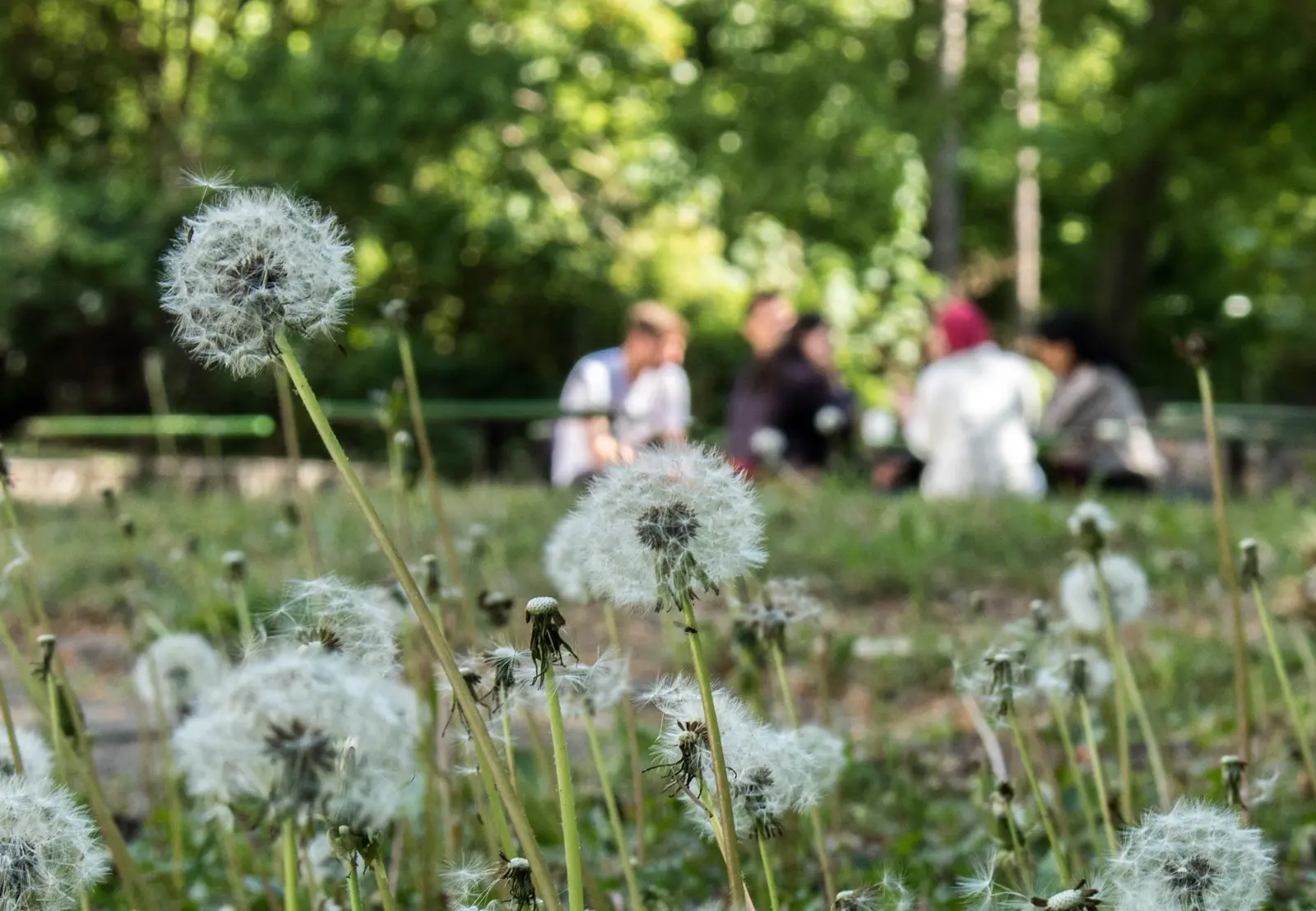
Joint doctoral programme of the Brandenburg universities of applied sciences
The doctoral college of Brandenburg’s universities of applied sciences is a joint academic institution for the award of doctoral degrees, established under §33 of the Brandenburg University and College Act. Its objectives are to create improved framework conditions for doctoral candidates at universities of applied sciences and to strengthen cross-university, particularly interdisciplinary and application-oriented, research. The doctoral programme is currently being developed.
Financial support
There are various options for financing a doctorate, including employment as a research assistant in the relevant working group, a scholarship from a foundation, or a doctoral position in a graduate programme.
In principle, there are positions specifically for doctoral candidates, project positions and scholarships. It is less advisable to have an external job or a domestic position alongside your doctoral studies (if these are not related to your doctoral studies).
HNEE publishes current job advertisements for research staff in the area of working at HNEE.
There are a number of different scholarships and scholarship providers. Here is a small selection of scholarship providers that may be relevant to you:
- 13 scholarship organisations, funded by the BMFTR
- German Federal Environmental Foundation
- DAAD – German Academic Exchange Service
- FAZIT Foundation
Please also bear in mind from the outset that experiments, travel to conferences and practice partners may involve costs.
In addition to basic funding, HNEE offers its doctoral students additional support options.
These can be found in the guidelines for the promotion of scientists in the early stages of their careers (WiKa).
Please submit applications via the following link: Application form for funding for early-career researchers.
Events and Workshops
To support doctoral candidates, we offer events on doctoral topics as well as workshops in selected subject areas that accompany a doctorate.
Once a year, the four universities of applied sciences in Brandenburg invite doctoral candidates and those interested in pursuing a doctorate to the Doctorate Day. The first → PhD Day of the Brandenburg universities of applied sciences took place in 2024 at FH Potsdam. HNE Eberswalde will host the 2025 PhD Day, and registration is now open. Details on the programme and registration can be found on the → PhD Day 2025 event website.
In cooperation with → InnoWest, Brandenburg’s universities of applied sciences hold the Research and Doctoral Colloquium online four times per semester. Prior registration is not required. Information on dates and topics is available on the → project website of the Research and Doctoral Colloquium.
The → Career Service and the → Start-up Center are also available to our doctoral students.

Good Scientific Practice
Setting the course for a successful doctorate
Research data management in doctoral studies
Time and self-management
FAQ on doctoral studies at the HNEE
- Check the doctoral regulations: Confirm whether you meet the requirements for a doctorate. HNEE does not yet have its own doctoral regulations, so the regulations of the cooperating university apply
- Prepare to get started:
- Identify a potential topic, research question, or area of focus. Important questions to consider: Is the topic specific enough for a dissertation? If not, refine it. Are you enthusiastic about the topic? Is it meaningful? Are there research gaps? Does the topic suit your professional profile?
- Find supervision at HNEE and at the cooperating university. Ideally, this should be a person with a strong research background in your subject or topic, preferably holding a professorship.
- Secure funding for at least three years.
- Develop a research plan: Discuss your topic and the identified research gap with both supervisors. Then prepare an initial synopsis for your dissertation. This should outline the current state of research, your planned approach, and a timetable. Tips and guidance can be found, for example, → here.
Your topic should be a good fit for you, but you should also be a good fit for the topic. Ideally, you already have some expertise in the area (for example from your thesis or Master’s dissertation) and are highly motivated to explore a question that has interested you for some time. For project-based positions, it is advisable to choose a topic that is related to the project so that synergy effects can arise. Occasionally, supervisors may propose topics that align with your interests. In such cases, you should consider whether the topic excites and motivates you enough to sustain your research over several years.
You may already know potential supervisors from your Bachelor’s or Master’s studies who are a good fit for your topic and subject area. If you hold a project position, colleagues from the project may also be suitable supervisors. Alternatively, you can explore all → research projects at HNEE independently of any position to identify a potential supervisor.
Start by finding out which universities your university already cooperates with, as formal arrangements are usually already in place. HNEE, for example, has a cooperation agreement with the → Leuphana University in Lüneburg, Faculty of Sustainability.
If you have a “new” university in mind, seek support from both supervisors (HNEE and the partner university) and from central administrative units to help establish the cooperation. Stay friendly and patient — you’ll be paving the way for future doctoral candidates. This is pioneering work.
For a cooperative doctorate, you must refer to the doctoral regulations of the partner university to check the admission requirements.
Consider the added value that both your university supervisor and HNEE can offer you: e.g. infrastructure, access to literature and databases, research groups and networks, as well as financial or other support for doctoral candidates. Make full use of these opportunities.
Plan regular visits to your university supervisor realistically — in terms of both time and funding (for example, twice a year) and record these meetings in your supervision agreement.
Act as a link between your supervisors and, by extension, between the two institutions. Communicate transparently and proactively. After each meeting, summarise the current status and agreements in an email. A regular meeting with both supervisors (also online, for example once a year) helps to ensure that everyone remains up to date and aligned.
Enjoy the chance to benefit from the best of both worlds. And if things don’t go quite as planned, reach out to fellow doctoral candidates at other universities of applied sciences. You’re not on your own. Doing a doctorate at a university of applied sciences is a team effort and a relatively new way of working together.
Are you interested in pursuing a doctorate?
If you are considering a doctorate at HNEE, we encourage you to get in touch by email and join our mailing list for doctoral candidates and prospective researchers. This ensures you receive updates on upcoming workshops, networking events and other opportunities.
HNEE also provides a dedicated Moodle course for doctoral candidates and those interested in doctoral study. It offers practical guidance and resources on topics such as the first steps towards a doctorate, funding options, and good academic practice. You will also find materials from recent workshops and events.